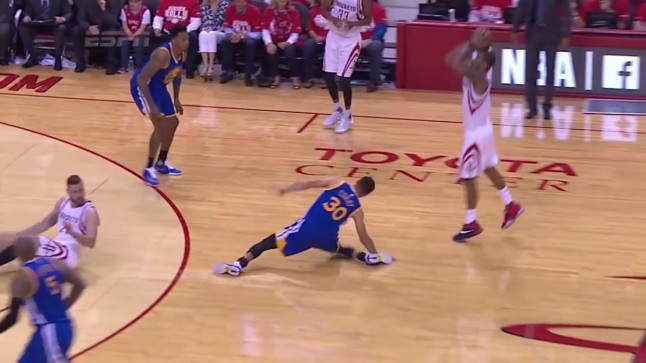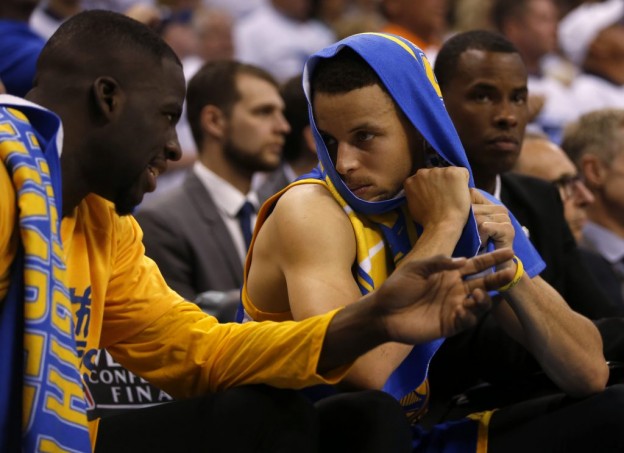The Golden State Warriors have a challenge in their Game 5 showdown with the Oklahoma City Thunder that is unique in scope.
They have two huge problems that need to be solved independently of each other, meaning that solving just one won’t be enough.
The Warriors, as it turns out, had an Achilles Heel. For those who have either forgotten their Greek mythology or never bothered to learn it, Achilles was a warrior (yes, really) who, when a baby, was dipped by his mother into the river Styx to make him impervious to any arrows he might encounter later in life. Unfortunately since Baby Bjorns weren’t invented yet, and she had to hold him in some way, she chose the tendon just above his heel and dumped him in. Achilles became a great hero in the battle with Troy, until he was struck by an arrow exactly in that spot. It was the death of a hero and the birth of a sports metaphor at the same time.
So, back to the story of our current Warriors, who have run roughshod over the NBA for the better part of two years, looking invincible. Then the playoffs started, and Steph Curry got hurt in Game 1. Luckily, it was only Houston, and it was not a serious injury. The Warriors led 2 games to 1 when Curry returned to the lineup, looking not quite like his regular self but on a path to get there with plenty of time to do it.
Then came the “sweat spot.” This is kind of strange, because when you live a life in sports, you get very used to talking about the “sweet spot.” Literally, it’s the part of a bat or golf club from which the ball carries almost magically. Figuratively, it’s a situation or circumstance that lends itself favorably to a player or team.
Even when I try to type “sweat spot,” it comes out “sweet spot” and I have to retype it, so I want you to know how much extra work I’m doing to try to make this point.
The Warriors’ season changed when Curry’s left foot his that “spot of sweat,” and while we don’t know yet exactly how it’s going to turn out, it’s been pretty terrible these last few days for the Warriors and their fans.
When Curry returned to the lineup against Portland, he was very effective. He saved the Dubs’ bacon in Game 4 (not just the overtime – they were down 16-2 when he entered), and hit the dagger 3-pointer in Game 5 that clinched the series and four days off before facing Oklahoma City.
What we didn’t know at the time was that Portland, while a very good offensive team which gave the Warriors all they could handle, lacked the kind of size and length that could make it difficult for the Warriors to run their offense.
Oklahoma City, on the other hand, is all that and a bag of chips.
The Warriors’ Achilles Heel, as it turns out, is length. Not size, as in Enes Kantor and Steven Adams playing together, but length, as in Kevin Durant, Serge Ibaka and Andre Roberson as a front line. Those three, expressed in wingspan, are 7-foot-5, 7-foot-0, and 6-foot-11. Billy Donovan has used this lineup when the Warriors go small, and the Thunder can match the Warriors’ quickness and overwhelm them with their length.
How many times have you seen the Warriors miss layups in this series? Length does that. The Thunder are able to recover even when they’re beaten to block a shot, and they’ve done it enough that the Warriors are freaked out around the rim. The fact that this lineup can also cause problems at the 3-point line gives the Warriors precious little real estate with which to work.
That’s the tactical challenge facing Steve Kerr and his coaching staff. How can they find the Achilles Heel of that lineup, a flaw they can exploit to the point where Donovan doesn’t feel comfortable using it?
That’s a daunting task, to be sure, but even if there is a solution AND the Warriors find it, it doesn’t solve their whole problem.
The other part needed to win Game 5 is between the Warriors’ ears, specifically those of Curry and Draymond Green. Granted, if Kerr and his staff come up with a really smoking tactical fix, as they did against Memphis and Cleveland last year, that will instill some confidence in his players. However, Curry and Green seem totally lost right now.
It seems impossible to even say about a team that won the championship last year and won 73 games this year, but it looks like they’re overwhelmed not just by the Thunder, but by the moment.
That’s the emotional part that is every bit as important for Kerr to solve. How can he get Curry and Green to forget Games 3 and 4 and return to the way they played in Game 2? That’s right, Game 2 of this very series, when the Warriors put a pounding on the Thunder every bit as convincing as what the Thunder have done to them.
Kerr’s in a tough spot. He needs to act with urgency, but not panic. I don’t see a wholesale lineup change coming, but to run the same groups out there and expect a different result is, by definition, insanity.
All season, the Warriors have said that their defense makes their offense go. While I would not question them on that, I have felt that the reverse has sometimes been more true. When they make their shots, they can set up their defense, giving them a better chance at not only a stop but a defensive rebound. Tonight, though, the adjustment has to come on the defensive end, and it can’t just be tactical. The Warriors need to defend passionately, aggressively (without fouling, Andrew Bogut) and completely, meaning they have to get the defensive rebound after they force a missed shot.
If they can do that, they will create opportunities for their offense to get easier baskets, which should help their confidence, which makes the tougher shots drop, too. It also could stick a pin in the Thunder’s confidence balloon, one that is bumping up against what’s left of the ozone layer.
Until a team loses four times, they’re not eliminated. It’s unusual for a team to come back from a 3-1 deficit, but it’s not unprecedented. The Warriors need to find tactical and emotional solutions — lather, rinse and repeat — until the Thunder become an answer to the trivia question:
“What team won two games by more than 25 points and still lost an NBA playoff series?”



